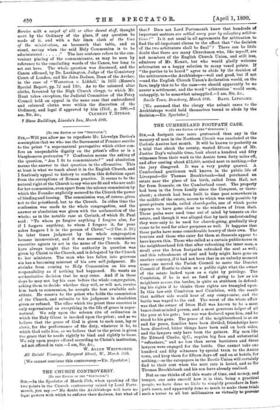[To THY EDITOR OP THZ "SPECTATOR. "] STS, —Will you allow me
to repudiate Mr. Llewelyn Davies's assumption that we who use the Sacrament of Penance ascribe
to the priest " a supernatural prerogative which either con- fers an unspeakable dignity on the priest's office or is a blasphemous pretension " ? Confession means the asking of the question, "Am I fit to communicate ?" and absolution means the answer to that question in the affirmative. This at least is what we teach about it in the English Church, and I fearlessly appeal to history to confirm this definition apart from the corruptions of Roman practice. It seems to be the natural right of the Church to say who are fit and who are unfit for her communion, even apart from the solemn commission by which the Founder explicitly secured to the Church the power of binding and loosing. The commission was, of course, given not to the priesthood, but to the Church. In olden time the confession was made to the whole congregation, and the answer or absolution was given with the acclamation of the whole; as in the notable case at Corinth, of which St. Paul said : "To whom ye forgive anything I forgive also, for if I forgave anything, to whom .1 forgave it, for your sakes forgave I it in the person of Christ."—(2 Cor. ii. 10.) In later times judgment by the whole congregation became inconvenient, and it was necessary to commission executive agents to act in the name of the Church. So we have always taught that the authority in question was given by Christ to the Church, and is delegated by the Church to her ministers. The man who has fallen into grievous sin has a becoming mistrust of his own self-judgment. He shrinks from coming to Holy Communion on his own responsibility as if nothing had happened. He wants an authoritative decision that he may come. And if in these days he may not lay his case before the whole congregation, asking them to decide whether they will, or will not receive him back to communion, he accepts the best available sub- stitute. He resorts to the priest who holds the commission of the Church, and submits to his judgment in absolution given or refused. The office which the priest thus executes is only supernatural as everything in the life of grace is super- natural. We rely upon the solemn rite of ordination in which the Holy Ghost is invoked upon the priest; and as we
believe that the grace of God is given to each man, lay or cleric, for the performance of the duty, whatever it be, to which God calls him, so we believe that to the priest is given the grace that he needs rightly to bind and rightly to loose. We rely upon prayer offered according to Christ's institution, nd not offered in vain.—I am, Sir, &c.,
W. ALLEN WHITWORTH.
An Saints' Vicarage, Margaret Street, W., March 26th.
[We cannot continue this controversy.—En. Spectator.]






































 Previous page
Previous page